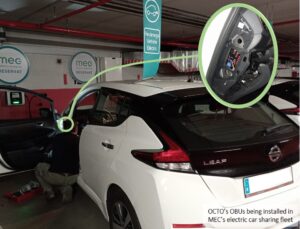Moliere’s Mobility Data Marketplace (MDM) functions as a mobility aggregation platform, where mobility services can be announced, discovered, combined, booked and paid for. This way, Moliere’s MDM becomes an instance of a two-sided mobility marketplace, with providers on one side, and end-users on the other.
Kickstarting the network effect of a two-sided marketplace like the MDM poses a challenge, however, which is often referred to as the “chicken and egg problem”: both service providers and end-users are interdependent and vital to the platform’s operation, so without the presence of one, attracting the other is very difficult.
A mechanism to tackle this problem is to incentivise the activity on the platform. In the case of the MDM, as a decentralised network, governance tokens were defined by Iomob as the incentivisation mechanism to prevent it from becoming capital-intensive (like centralised software-as-a-service platforms). As such, the platform can distribute these tokens as a reward to service providers for offering their services, and to users for their participation, booking, and payment for services.
While this mechanism seems an easy win, a key difficulty is presented: while governance tokens incentivise participation on the MDM platform, they also expose it to the risk of fraud, as participants may simulate activity to collect rewards thereby threatening the platform’s integrity. This is why the third of Molière’s use cases has been focused on introducing Proof of Mobility Service (PoMS): an approach that seeks to validate real services were delivered within the MDM, and thus curtail incentive collection fraud from dishonest players who may want to simulate the delivery of real mobility services to receive tokens.
To test the PoMS, MEC Carsharing fleet was chosen as the reference scenario, where rentals were assumed to take place through the MDM, and an allocation of incentives based on car rentals by end-users calculated, proportional to the distance the cars moved around.
To replicate the potential MDM fraud, a rogue provider could simulate extra trips without actually moving their cars at all. The PoMS solution to this problem was to introduce an independent party that reports the movements of the vehicles, then allocating incentives only if the two data sources match.
With the permission granted by MEC carsharing, Octo Telematics devices were deployed in part of their fleet. The devices that were used are Octo EasyPro, a compact telematics On Board with an internal antenna, e-Sim and a Multi-Constellation GNSS receiver (where the relevance of Galileo in terms of accuracy and reliability was required).

The collected and analysed data represented 20 different cars, 902 trips and 112,957 readings. The dataset was then compared with the bookings reported by MEC and processed through the PoMS implementation, and the percentage of trips incorrectly detected either as positive and false negatives was recorded.
As could be expected, excessively small trips yielded a high number of false positives due to the mismatching of independent sensors that are not synchronised in time, also considering large noise to the readings were artificially added to add complexity to the baseline scenario. Error rates then started diminishing sharply around threshold 40 metres, and disappeared almost entirely for thresholds larger than 75m. Consequently, a threshold of 100m was set to leave a safety margin. In consideration that shared mobility trips are expected to be much longer than the 100m accuracy margin, the incentives will remain unaffected in practice.
It is also worth noting that the scheme produced no false negatives. This is highly desirable in the scenario as a fraudulent participant will attempt to report a large number of inexistent trips, not just one, which will need to be filtered out.
The absence of false negatives in the experiment is highly promising, as it implies that the system is robust to attempts by fraudulent participants to report nonexistent trips, while the minimal error rate of false positives has a negligible impact on the aggregate incentives collected by the provider.
Expanding the implementation of PoMS to other mobility modes remains as future work.



